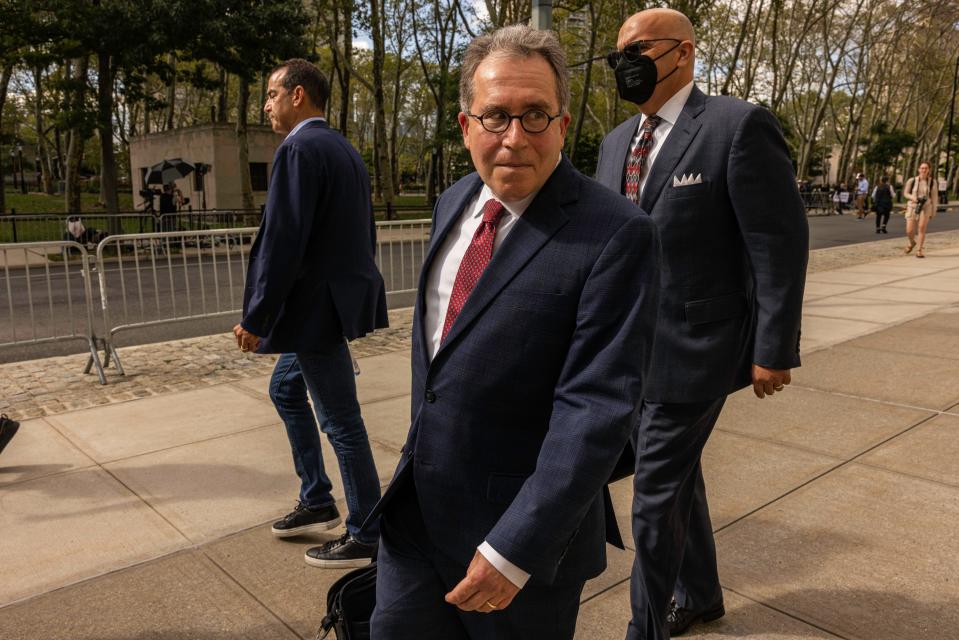The Mar-a-Lago special master wants answers from Trump. The dispute over 'declassified' docs explained
- Oops!Something went wrong.Please try again later.
The special master in former President Donald Trump's case over seized Mar-a-Lago documents told his attorneys Tuesday to supply evidence that Trump declassified records stored there, or to otherwise stop making the argument – simply put, the neutral third-party said, "you can't have your cake and eat it."
A federal judge in Florida has effectively put the Justice Department's criminal probe in the case on hold until the special master she appointed at Trump's request completes a review for privileged information. The DOJ has partially appealed her decision saying it urgently needs to review the 100 or so sets of documents, or more than 700 pages labeled as classified.
Here's what you need to know about the special master's role and this case:
What and who is the special master? A special master is a neutral third-party arbiter who in this case is in charge of assessing whether any of the documents seized by the Justice Department when executing an Aug. 8 search warrant on Mar-a-Lago were governed by executive privilege or attorney-client privilege. In this case it's a senior federal judge in the Eastern District of New York, Raymond Dearie, who has spent a lifetime handling high-profile cases.
Why are we talking about classified or declassified records? Trump's attorneys argued that the president has broad powers to declassify information, but in court filings have tiptoed around actually saying whether the president did or did not declassify documents. Trump himself has said he had a standing order to "automatically declassify" all documents he took home from the Oval Office.
Why does it matter if the records are declassified? The DOJ has argued that roughly 100 "secret" and "top secret" documents seized from Mar-a-Lago belong to the government and are also part of an ongoing criminal investigation. The DOJ said their release could cause "immediate and serious harms to the government and the public."

Multiple ongoing, complex cases
After the FBI executed a court-approved search warrant on Trump's Mar-a-Lago home, Trump's attorneys filed suit in federal court, arguing the government violated his rights and committed overreach. That case is before Trump-appointed U.S. District Judge Aileen Cannon in Florida.
A grand jury in Washington has also subpoenaed Trump aides and associates in an investigation of the Capitol attack on Jan. 6, 2021, for issues such as fake electors and Trump's fundraising.
In the documents case, Cannon approved Trump's request for a special master – which came weeks after the search itself – and appointed Dearie. The DOJ previously said its own "filter team" had gone through the documents to assess whether any documents were covered by attorney-client privilege. The team found about 500 pages of personal or privileged documents.
The Office of the Director of National Intelligence is conducting its own review of the national security risk of possible unauthorized disclosure of the classified records and any harm that may have occurred, according to DOJ court filings.
Big Picture:Trump has argued he declassified Mar-a-Lago documents. In DOJ probe, it might not matter
The DOJ asked Cannon to put a partial stay on her order blocking investigators from reviewing the highly classified records, but she rejected the request. Instead, Cannon told the DOJ it could not review the classified documents seized for its criminal investigation until the special master's review is complete. The order essentially puts a pause on the investigation.

Dearie has estimated it will take until Nov. 30 to complete his review.
The DOJ has partially appealed Cannon's order to the U.S. Court of Appeals for the Eleventh Circuit, arguing it urgently needs the ability to review about 100 classified documents, making up more than 700 pages, for potential criminal violations. If a three-judge panel of the appeals court refuses to lift the temporary pause on the investigation, DOJ officials have said they will consider other appeal options, including petitioning the Supreme Court.
Outlines on the DOJ criminal probe
The federal laws used to justify the search do not require the documents to be classified for a crime to be committed. In fact, the provisions of federal law contained in the Espionage Act, obstruction and the mishandling of government records and reports mentioned in the search affidavit don't even include the words "classified" or "confidential."
The first two laws – should charges be brought – would carry the heftiest penalties of fines and up to 10 and 20 years in prison, respectively.
In approving the search warrant, a federal magistrate agreed there was probable cause FBI agents would uncover evidence that these three provisions of federal law were violated.
That's why some legal experts have called the argument by Trump's team over declassification a "red herring."
This article originally appeared on USA TODAY: Explained: Why the Mar-a-Lago special master wants answers from Trump
